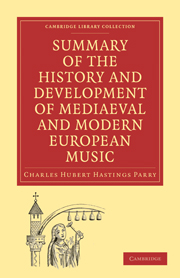Book contents
- Frontmatter
- PREFACE
- Contents
- CHAPTER I THE MUSIC OF THE MIDDLE AGES
- CHAPTER II MUSIC IN ENGLAND FROM THE BEGINNING OF TUDOR TIMES TILL THE RESTORATION OF THE STUARTS
- CHAPTER III THE BEGINNINGS OF OPERA AND ORATORIO
- CHAPTER IV THE PROGRESS OF OPERA IN VARIOUS COUNTRIES, FROM THE MIDDLE OF THE SEVENTEENTH CENTURY TILL THE TIME OF GLUCK
- CHAPTER V ORATORIO IN THE TIME OF BACH AND HANDEL
- CHAPTER VI THE PROGRESS OF INSTRUMENTAL MUSIC UP TO THE TIME OF J. S. BACH
- CHAPTER VII THE PROGRESS OF INSTRUMENTAL MUSIC IN THE EIGHTEENTH CENTURY
- CHAPTER VIII OPERA IN GLUCK AND MOZART'S TIME, AND IMMEDIATELY AFTER
- CHAPTER IX THE PROGRESS OF INSTRUMENTAL MUSIC TO BEETHOVEN AND HIS IMMEDIATE SUCCESSORS
- CHAPTER X MODERN INSTRUMENTAL MUSIC
- CHAPTER XI MODERN OPERA
- CHAPTER XII MODERN VOCAL MUSIC
CHAPTER II - MUSIC IN ENGLAND FROM THE BEGINNING OF TUDOR TIMES TILL THE RESTORATION OF THE STUARTS
Published online by Cambridge University Press: 29 August 2010
- Frontmatter
- PREFACE
- Contents
- CHAPTER I THE MUSIC OF THE MIDDLE AGES
- CHAPTER II MUSIC IN ENGLAND FROM THE BEGINNING OF TUDOR TIMES TILL THE RESTORATION OF THE STUARTS
- CHAPTER III THE BEGINNINGS OF OPERA AND ORATORIO
- CHAPTER IV THE PROGRESS OF OPERA IN VARIOUS COUNTRIES, FROM THE MIDDLE OF THE SEVENTEENTH CENTURY TILL THE TIME OF GLUCK
- CHAPTER V ORATORIO IN THE TIME OF BACH AND HANDEL
- CHAPTER VI THE PROGRESS OF INSTRUMENTAL MUSIC UP TO THE TIME OF J. S. BACH
- CHAPTER VII THE PROGRESS OF INSTRUMENTAL MUSIC IN THE EIGHTEENTH CENTURY
- CHAPTER VIII OPERA IN GLUCK AND MOZART'S TIME, AND IMMEDIATELY AFTER
- CHAPTER IX THE PROGRESS OF INSTRUMENTAL MUSIC TO BEETHOVEN AND HIS IMMEDIATE SUCCESSORS
- CHAPTER X MODERN INSTRUMENTAL MUSIC
- CHAPTER XI MODERN OPERA
- CHAPTER XII MODERN VOCAL MUSIC
Summary
When the Wars of the Roses came to an end in 1485, and the astute government of Henry VII. gave England time to regain her balance, Music began to be cultivated to some purpose in this country. The Tudors appear to have been a genuinely musical family, and their influence upon all kinds of arts was uniformly good. Henry VII. himself had a large musical establishment, and the taste and skill of his son, afterwards Henry VIII., were favourable to the state of music at Court. The standard of musical composition in this reign was not very high, but excellent purpose is shown in the works of Dr. Robert Fayrfax, Sheryngham, Turges, Newark, Phelyppes, and others.
In Henry VIII.'s reign these somewhat tentative beginnings passed into vigorous exercise of musical faculty. The King himself produced some excellent compositions, and set a good example by his ability in singing at sight, which accomplishment came before long to be considered a necessary part of the equipment of a properly educated gentleman.
Various fortunate circumstances caused the transition from Roman Catholicism to Protestantism in England to be gradual and moderate, with the happy result that the noble style of the Roman Church music of that age passed without change into the music of the Reformed Church. Before the Reformation became an accomplished fact, there were already a number of composers and musicians of great ability in the country, most of whom gave the Reformed Church the benefit of their powers, sometimes without forsaking the old Church themselves.
- Type
- Chapter
- Information
- Publisher: Cambridge University PressPrint publication year: 2009First published in: 1893



